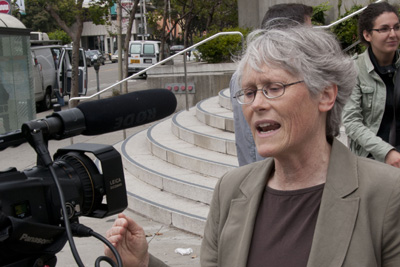Revolution #239, July 17, 2011
Interview with Carol Strickman, staff attorney for Legal Services for Prisoners with Children
"The CDCR is using every method they have to try and stop this hunger strike"
Revolution interviewed Carol Strickman, staff attorney for Legal Services for Prisoners with Children and staff to the mediation team representing the hunger strikers, on July 13, 2011 in San Francisco.
Revolution: Can you tell me what we know about the conditions of the prisoners that are on hunger strike?
Carol Strickman: The conditions of the prisoners before the hunger strike I think you know, then add the hunger strike on top of that. The people who are drinking water can get through this longer. Depending on their medical conditions they are going to have problems sooner rather than later. As I mentioned they are sending a nurse around on an hourly basis to check on who has fallen over, who is now unconscious and moving those people out. Dozens have been moved out.
Revolution: Where have they been moved to?
Carol Strickman: Either they have been moved to the medical facility in the prison which is very small. I understand it has 20 beds max—10 for medical and 10 for mental health. I don't know how they are doing it. Some may be being moved out to nearby hospitals or they could be being transported to medical prison hospitals.
The CDCR is using every method they have to try and stop this hunger strike and to scare the prisoners. They passed around a flyer saying that this is what will happen if you go on strike. It would not surprise me if they are going around trying to talk people out of it. We've been asking for negotiations; up until very recently the position was, "we do not negotiate with prisoners." Our mediation team has not been recognized as a mediation team to be dealt with. That may be changing. There have been meetings but there hasn't been negotiating.
Revolution: After 12 days of the hunger strike the CDC has not even negotiated with the representatives of the prisoners?
Carol Strickman: That's exactly right. And they're using various methods to divide and conquer, as this might be. They want this to quietly go away.
Revolution: Have attorneys representing the prisoners or outside medical personnel been able to visit the prisoners?
Carol Strickman: To my knowledge there has been no outside medical contact with prisoners.
Revolution: What kind of retaliation has there been against leaders or those participating in the strike?
Carol Strickman: There has been retaliation in advance, there have been provocative acts before the hunger strike started. For example, "potty watch," not only of the leaders but of anyone that has indicated support.
Revolution: What is "potty watch"?
Carol Strickman: That's a very cruel procedure where people are restrained for three days, put in diapers and unable to move their arms sometimes, or forced to stand, or strapped down. The rationale is that the prisoner has swallowed contraband and we are going to see it. We're going to wait for three days and monitor their bowel movements and find the thing they've swallowed. But, it's used for other reasons. It's used as punishment even if they know that there is nothing there. This shouldn't be used even if they think that there is something that the prisoner has swallowed. It's painful, people can't sleep. They can't move their arms. I heard that sometimes their arms are put in a plastic pipe. It's really horrible. We heard of that happening to one or two people before the hunger strike started in Pelican Bay.
Revolution: What about attempts to divide the prisoners?
Carol Strickman: The thing that is unique and important about this hunger strike is that it transcends all groups. The prison is interested in defining groups, labeling groups, you have to be in one group. What's happened is that all of the groups have come together. I've heard prisoners use the term collective. Groups that have been mortal enemies have come together around this and that is very uncomfortable for CDCR so they are doing things to try and break that unity.
Revolution: Anything you want to add?
Carol Strickman: People need to educate themselves about what the conditions are really like. Once you really understand what the conditions are like then you know everything you need to know.
 |
| Photo: Special to Revolution |
If you like this article, subscribe, donate to and sustain Revolution newspaper.



